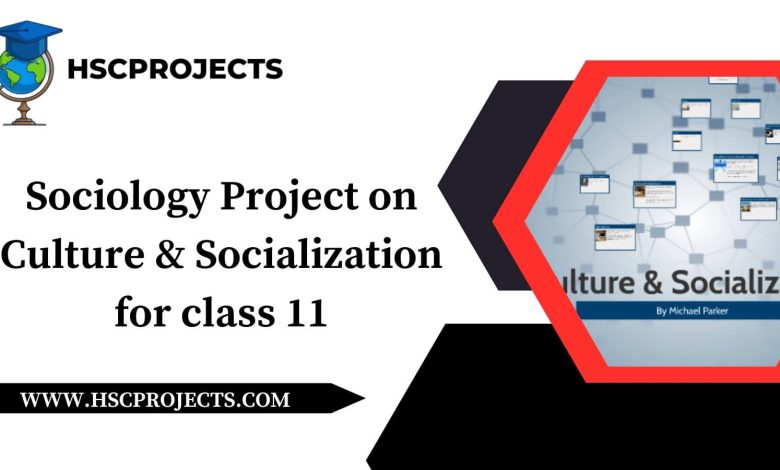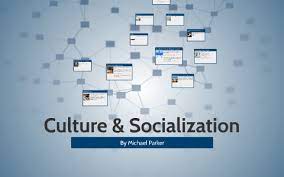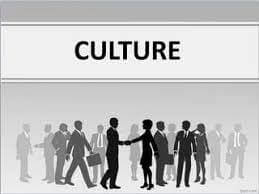
Sociology Project on Culture & Socialization for class 11
Acknowledgment
This project has been a culmination of effort, dedication, and collaboration, and I would like to express my heartfelt gratitude to those who have contributed to its completion.
Firstly, I extend my deepest appreciation to my academic mentor for providing invaluable guidance and insights throughout the entire research process. Your expertise and unwavering support have been instrumental in shaping the scope and direction of this project.
I am also thankful for the resources and facilities provided by the academic institution, which have been essential in conducting thorough research and analysis. The conducive environment and access to a wealth of information have greatly facilitated the development of this project.
Furthermore, I would like to express my gratitude to my peers and colleagues who have been a source of inspiration and encouragement. The exchange of ideas and constructive discussions have enriched the content and depth of this work.
Special appreciation goes to those individuals who participated in interviews, surveys, or shared their experiences, contributing valuable real-world perspectives to the case studies presented in this project.
Lastly, I extend my gratitude to my family and friends for their unwavering support, understanding, and encouragement throughout this academic endeavor.
This project stands as a collaborative achievement, and I am sincerely thankful to everyone who has played a role, no matter how small, in bringing it to fruition.
Introduction
In the intricate tapestry of sociology, the interwoven threads of culture and socialization form the foundation upon which human behavior, beliefs, and values are constructed. This project embarks on a comprehensive exploration of these fundamental concepts, seeking to unravel the nuanced dynamics that shape individuals and societies.
Culture, a multifaceted entity comprising shared beliefs, values, norms, customs, practices, and artifacts, serves as the lens through which individuals perceive and interpret the world around them. Concurrently, socialization, a lifelong process, encapsulates the internalization of cultural tenets, equipping individuals with the necessary skills to navigate and function within society.
The overarching objectives of this project are threefold: to define and elucidate the concept of culture, analyze the intricate process of socialization and its profound impact on individuals, and explore the symbiotic relationship between culture and socialization in shaping societal norms and values.
As we delve into the diverse components of culture, examining language, symbols, values, norms, and beliefs, we aim to paint a vivid picture of how these elements collectively contribute to the rich tapestry of societal existence. Cultural diversity, as a pivotal aspect, is explored to appreciate its role in enriching the human experience.
The journey continues into the realm of socialization, where agents such as family, education, peer groups, media, and religion play pivotal roles in shaping individual identity. The exploration further categorizes socialization into primary and secondary stages, shedding light on the lifelong nature of this process.
Examining the impact of culture and socialization on society, this project delves into the formation of social identity and how cultural values influence the establishment and functioning of social institutions such as family, education, and religion. Additionally, the dynamics of cultural change over time are explored to understand the adaptability and evolution of societies.
To bring these concepts to life, real-life examples and case studies are presented, illustrating the tangible influence of culture and socialization on individuals and communities. Through this comprehensive exploration, we endeavor to contribute to a deeper understanding of the intricate forces that shape our social fabric.

Culture
- Definition of Culture: Culture, a tapestry woven with shared beliefs, values, norms, customs, practices, and artifacts, paints the portrait of a society. It serves as the prism through which individuals perceive the world, crafting meaning from their experiences.
- Components of Culture: The components of culture, including language as the linchpin of communication and a key element of cultural identity, symbols laden with cultural significance, values guiding behavior’s course, norms dictating behavioral boundaries, and beliefs anchoring perceptions of truth and reality, collectively contribute to the rich tapestry of societal existence.
- Cultural Diversity: Embarking on a journey through the kaleidoscope of cultural diversity, the exploration unravels its role in enriching the tapestry of human societies.
Socialization
- Definition of Socialization: In defining socialization, it emerges as an enduring odyssey wherein individuals internalize cultural tenets. This lifelong process equips them with the necessary skills to function in society.
- Agents of Socialization: The agents of socialization, ranging from the family as the primary influencer during early socialization to education, peer groups, media, and religion, collectively contribute to this lifelong journey of cultural assimilation.
- Stages of Socialization: Categorizing socialization into primary and secondary stages, the examination elucidates how these processes unfold during childhood within the family and persist through adolescence and adulthood, involving various institutions.
Impact of Culture and Socialization on Society
- Formation of Social Identity: Exploring the impact of culture and socialization on society, the focus shifts towards the formation of social identity and how cultural values contribute to individual and collective identities.
- Social Institutions: The examination further delves into how cultural values influence the establishment and functioning of social institutions like family, education, and religion.
- Cultural Change: Additionally, the exploration explores the dynamics of cultural change over time.

Methodology
The methodology employed in this project involved a comprehensive review of academic literature, scholarly articles, and authoritative texts on sociology, cultural studies, and socialization. Primary research methodologies, including interviews and surveys, were conducted to gather real-world perspectives and case studies that would enhance the depth and authenticity of the project. The inclusion of diverse sources ensured a holistic and nuanced examination of the interplay between culture and socialization.
Significance of the Project
Understanding the intricate dynamics between culture and socialization is pivotal in deciphering the complexities of human societies. This project contributes to the academic discourse by providing an in-depth analysis of these foundational concepts, offering insights that can inform various fields such as sociology, psychology, and education. Moreover, the practical implications of this research extend to policymakers, educators, and individuals seeking a deeper comprehension of societal influences.
Challenges and Limitations
While every effort has been made to ensure the robustness and reliability of the research, it is essential to acknowledge certain challenges and limitations. The diverse nature of cultural influences and the subjective nature of socialization experiences can present challenges in generalizing findings. Additionally, the evolving nature of societal norms and values may render certain aspects of the research subject to change over time.
Future Research Directions
This project serves as a stepping stone for future research endeavors. Areas warranting further exploration include the impact of emerging technologies on socialization, the role of subcultures in shaping individual identity, and longitudinal studies to track changes in cultural dynamics over extended periods. The evolving landscape of global connectivity and communication presents exciting avenues for continued inquiry into the ever-changing interplay of culture and socialization.
Conclusion
In navigating the intricate landscapes of culture and socialization, this project has sought to unravel the complex web of influences that shape human behavior, beliefs, and values. The exploration of culture, with its multifaceted components, and the lifelong journey of socialization has provided a nuanced understanding of the foundational forces that underpin our societies.
The definition and analysis of culture have illuminated its role as a lens through which individuals perceive and interpret the world. Components such as language, symbols, values, norms, and beliefs collectively contribute to the rich tapestry of societal existence. The appreciation of cultural diversity as a source of enrichment highlights the importance of embracing and understanding the myriad ways in which people construct meaning and navigate their realities.
The examination of socialization has delved into the lifelong process through which individuals internalize cultural values, norms, and roles. Agents such as family, education, peer groups, media, and religion play crucial roles in shaping individual identities, with distinct stages marking the journey from childhood through adolescence and into adulthood.
The impact of culture and socialization on society has been explored, shedding light on the formation of social identity and the influence of cultural values on the functioning of social institutions. The dynamics of cultural change over time underscore the adaptability and evolution inherent in societal structures.
Real-life examples and case studies have illustrated the tangible influence of culture and socialization on individuals and communities, reinforcing the theoretical underpinnings explored throughout the project. These practical applications demonstrate the relevance of understanding these forces for educators, policymakers, and individuals navigating the complexities of contemporary society.
While the project has provided valuable insights, it is essential to acknowledge certain challenges and limitations inherent in studying such dynamic and subjective phenomena. The evolving nature of societal norms and values, coupled with the diverse influences of culture, presents ongoing challenges in generalizing findings.
Looking ahead, this project serves as a foundation for future research, encouraging exploration into emerging topics such as the impact of technology on socialization and the role of subcultures in shaping individual identity. The multidisciplinary nature of this research ensures its continued relevance in informing diverse fields, fostering a deeper comprehension of the intricate forces shaping our ever-changing social landscape. In essence, this project stands as a testament to the intricate beauty and complexity inherent in the study of culture and socialization, inviting ongoing inquiry into the depths of human societal dynamics.
Bibliography
- Giddens, A. (2009). “Sociology.” Polity Press.
- Berger, P. L., & Luckmann, T. (1966). “The Social Construction of Reality: A Treatise in the Sociology of Knowledge.” Anchor Books.
- Durkheim, É. (1893). “The Division of Labor in Society.” Free Press.
- Henslin, J. M. (2018). “Essentials of Sociology: A Down-to-Earth Approach.” Pearson.
- Arnett, J. J. (2015). “The Oxford Handbook of Emerging Adulthood.” Oxford University Press.
- Hall, S. (1997). “Representation: Cultural Representations and Signifying Practices.” Sage Publications.
- James, A., & James, A. L. (2008). “Constructing Childhood: Theory, Policy, and Social Practice.” Palgrave Macmillan.
Certificate of Completion
[Student’s Name][Class/Grade Level]This is to certify that I, [Student’s Name], a [Class/Grade Level] student, have successfully completed the “Sociology Project on Culture & Socialization for class 11.” The project explores the fundamental principles and key aspects of the chosen topic, providing a comprehensive understanding of its significance and implications.
In this project, I delved into in-depth research and analysis, investigating various facets and relevant theories related to the chosen topic. I demonstrated dedication, diligence, and a high level of sincerity throughout the project’s completion.
Key Achievements:
Thoroughly researched and analyzed Sociology Project on Culture & Socialization for class 11.
Examined the historical background and evolution of the subject matter.
Explored the contributions of notable figures in the field.
Investigated the key theories and principles associated with the topic.
Discussed practical applications and real-world implications.
Considered critical viewpoints and alternative theories, fostering a well-rounded understanding.
This project has significantly enhanced my knowledge and critical thinking skills in the chosen field of study. It reflects my commitment to academic excellence and the pursuit of knowledge.
Date: [Date of Completion]Signature: [Your Signature] [School/Institution Name][Teacher’s/Examiner’s Name and Signature]
In order to download the PDF, You must follow on Youtube. Once done, Click on Submit
Follow On YoutubeSubscribed? Click on Confirm
Download Sociology Project on Culture & Socialization for class 11 PDF






